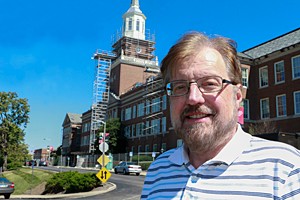
A Look into Why the Horrifying Is So Very Intriguing
Its an age-old question thats also very timely as we approach the season of haunted houses, scary movies and encounters with Halloween zombies and ghouls stopping by to beg for candy. Why is horror so popular? Why does something strange or even repulsive still make us want to look?
Gary Vaughn, a University of Cincinnati associate professor of English, digs into the underlying themes of the popular TV show, American Horror Story: Freak Show to explore these questions. Vaughn is among the UC faculty to be well represented at the conference of the
Midwest Popular Culture Association/Midwest American Culture Association
which
takes place Oct. 1-4, at the Hilton Cincinnati Netherland Plaza Hotel downtown.
Vaughns presentation examines the FX networks American Horror Story: Freak Show in terms of its danger and allure of monsters as well as what he calls the shows bait-and-switch appeal to its audience that starts out in voyeurism but ends in reflection.
While the plot landscape of Freak Show may have more dead ends than a new subdivision and the blunt sexuality may make us squirm in horror more intellectual than psychological, these writing choices are, I believe, deliberate attempts to make us, the audience, confront our own stereotypes about difference and disability, says Vaughn.
Vaughn explains that the beginning of this television viewing experience is similar to that of audiences that used to pay to take a seat at the carnival side shows of the 19th century shows that featured the bearded lady or two-headed animals. Theres an attraction to oddities outside of our everyday experience.
As the series unfolds, were forced to confront what we consider issues of freakishness, Vaughn continues. The freaks in the series have their own sense of justice, their own sense of trust sometimes misplaced and their own ethics. In many instances, they demonstrate more admirable human qualities than the towns so-called ordinary characters, explains Vaughn.

Image of associate professor of English Gary Vaughn
Vaughn says while the show has been criticized for its over-the-top performances, disjointed plots and graphic sex and violence, Freak Show also forces audiences to consider the out of the ordinary as part of our social desire to separate people that we see differently than ourselves, including the disabled or the abnormal.
Freak Show forces us to confront our own intellectual fears about difference, about diversity and about fears of change, says Vaughn. It takes us from the voyeuristic appeal at the beginning of the season to getting us to pause and think about who might be the real freak whats so bad about being abnormal or an anomaly?
The mission of the Popular Culture Association/American Culture Association is to promote the study of popular culture throughout the world through the establishment and promotion of conferences, publications and discussion. The PCA/ACA actively tries to identify and recruit new areas of scholarly exploration and new and innovative ideas.
UCs Department of English and Comparative Literature
in the
McMicken College of Arts and Sciences
fosters the liberal arts by focusing on English-language texts across four mutually-interrelated disciplines: literary and cultural studies, creative writing, professional writing, and rhetoric and composition.
Related Stories
UC hosts talk on applying geography to business
Event: April 17, 2025 2:00 PM
UC's Department of Geography will play host to guest speaker and Bentley University Professor Joel Deichmann who will discuss ways economic geography can be applied to business majors.
Volcanic ash buried huge herd of Nebraskan rhinos
April 14, 2025
Discovery magazine highlights UC research examining how prehistoric rhinos lived in mega-herds 12 million years ago.
UC celebrates community champions with prestigious...
April 14, 2025
UC honors Over-the-Rhine Community Housing and faculty with the Roger Grein and Jack Twyman Awards, celebrating impactful service-learning and community engagement.
